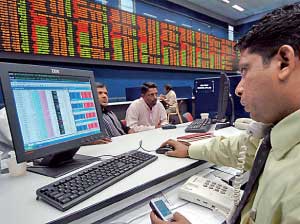Sunday Feb 22, 2026
Sunday Feb 22, 2026
Monday, 5 June 2017 01:09 - - {{hitsCtrl.values.hits}}
 Members of the Colombo Stock Exchange are opposing a recommendation by ADB Consultants to offer 50% stake in the future demutualised Bourse.
Members of the Colombo Stock Exchange are opposing a recommendation by ADB Consultants to offer 50% stake in the future demutualised Bourse.
The proposal for a 50:50 split in shareholding was shared at a recently convened Securities and Exchange Commission industry stakeholder meeting.
Representatives of the 15 member firms of the CSE were aghast at the recommendation since the thinking within the industry is a preference for a 80:20 split with the minority stake offered to the Government.
The CSE is incorporated as a company by limited guarantee and as part of capital market reforms and a development initiative, demutualisation has been recommended for some time now given its far-reaching benefits.
An eventual demutualised stock exchange will be listed on the Colombo Bourse itself.
For demutualisation the SEC Act has to be amended enabling it to regulate not a solitary exchange but more than one.
Brokers are of the view that their ownership in a future demutualised exchange cannot be diluted given their own investments and commitments over the years in developing capital markets despite challenging times in the CSE’s 30-year history.
The rationale for the ADB Consultant’s proposal is that the Government has supported the development of capital markets and proceeds from its stake will be channelled to a Capital Development Market Fund, which will be ploughed back to the industry.
Demutualisation will result in a separation of trading rights and ownership. This would bring about an improved governance structure that is able to better respond to changing market dynamics. Furthermore, as a demutualised Exchange, the CSE will be empowered to pursue new business strategies by attracting investment, expanding its current technology platforms and broadening the product and service offerings.
Stakes among 15 member brokers and the Government will be shared as per the value of the CSE. As of 2015, the CSE’s assets were worth Rs. 2.5 billion and at the Group level the figure was Rs. 3.3 billion.
In the 2015 Annual Report of the SEC its Chairman Thilak Karunaratne said facilitation of the conversion of the CSE from a mutual company owned by its members to a company owned by shareholders is expected to transform the CSE’s business model to a for-profit Exchange, reform its governance structure and increase the ability of the Exchange to unlock value, and requires extensive legislative changes. The SEC and CSE are in the process of deliberating on determining the value allocation of the Exchange among its stakeholders.
SEC Director General Vajira Wijegunawardane said the demutualisation of the CSE as made possible by the proposed Demutualisation Bill is necessary in order to segregate ownership and management from the trading rights of CSE members such that the strategic interests of the Exchange may be better pursued.
“This in turn will better represent the interests of all capital market stakeholders in the CSE: a priority of the SEC, as its regulator. We now have in place a draft Bill for demutualisation, and look now to reviewing the draft for adequacy, and finalising value allocation among stakeholders prior to presenting the Bill to Parliament simultaneously with the SEC Act,” Wijegunawardane added.